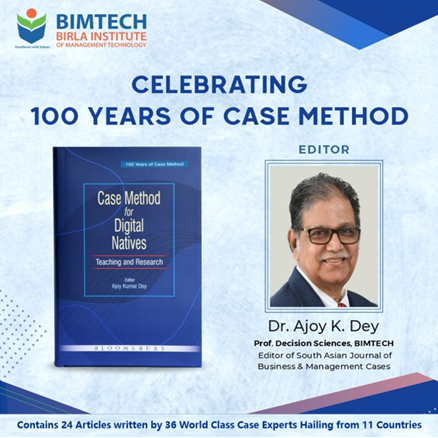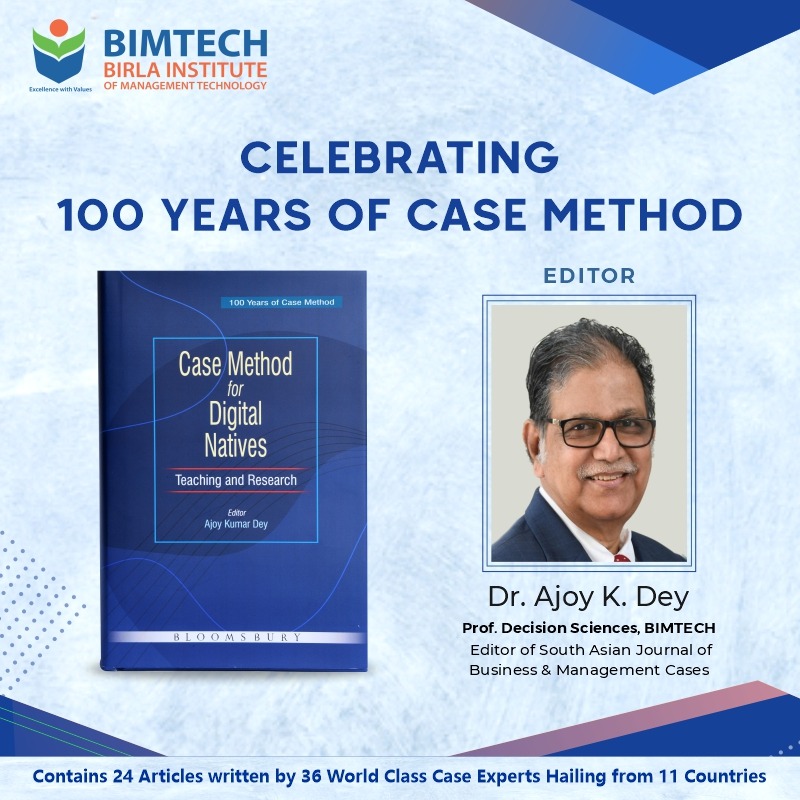
A unique book discussing the future of case method in its centennial year :
Case Method for Digital Native – Teaching and Research
 Dr. Ajoy Kumar Dey
Dr. Ajoy Kumar Dey
Chairperson – Centre for Management Case Development (CMCD)
Professor of Operations & Decision Science
The year 2021, marks 100 years of the Case Method, the use of which started in Harvard Business School, in 1921. That year marked the complete shift of class delivery to cases. The lecture method was completely discarded. The primary role of a case is to cover a section of the course and inculcate critical thinking, problem solving and decision making in the Management Students.

In the past few decades the world has witnessed exponential changes in business and society. Digitisation and growth of technology in our day to day lives has influenced our ways of thinking and working. The new generation is oblivious to the limitations of the past. The recent pandemic has made us realise that the future is unprecedented, and that we have to constantly be prepared for the unknown.
In these extraordinary times, a question comes up whether case method, which has survived past century, will still remain relevant or it has to adapt to the newer world order? Will the present method of crafting a case and delivering it in a class be able to take on the pressure of generation shift to Gen Z, the pressure of technology advancement during Industry 4.0, the forced shift to online environment, increased awareness of sustainability and the behavioural changes in the work and personal spaces? Will the Case Method remain relevant as a pedagogical tool and a preferred theory building research strategy? Will the case method continue to play an instrumental role in preparing the future managers and scholars to make this world a better place for all. However, the traditional ways of writing and teaching cases may not suffice anymore. The authors and academic faculty are required to evolve with the need of the hour and develop and use cases which not only engage the students but also give them the opportunity to deal with contemporary issues.
In the 21st century, the evolution of case method must take place on two dimensions: to include new knowledge fresh cases need to be written and the shift in the necessary skill sets required for the managers of today need to be addressed. Though decision making and problem solving in applied environs remain necessary, three primary skill sets have become vital in the business world today. These include Learning and Innovation Skills, Information Media and Technology Skills and Life and Career Skills. The Learning and Innovation Skills were always the central to become good managers and leaders. However, the latter two have become increasingly significant to not just succeed but also survive. The case authors should take cognizance of these two demands while writing cases. Only such cases will remain relevant among the management faculty.
BIMTECH is deeply committed to case method. The Centre for Management Case Development is eleven year old. The international case conference ICMC is running for the past eleven years. The case research journal the South Asian Journal of Business and Management Cases is running its tenth year. The case competition for students now draws over 300 teams from pan India.
When we learnt about the centenary year celebration of case method by Harvard Business School, we also thought of celebrating by coming out with a book on case method.
Keeping the above in mind the book titled, Case Method for Digital Natives: Teaching and Research was conceptualised in February 2021, by Dr. Ajoy Kumar Dey, Chairperson, BIMTECH Centre for Management Case Development and Editor of South Asian Journal of Business and Management Cases (SAJBMC). The book was launched on the Occasion of Gandhi Jayanti, i.e. 2nd October 2021, which is also the Foundation Day of Birla Institute of Management Technology. It was Edited by Dr. Dey and sub-edited by Dr. Shreya Mishra, Assistant Prof. OB& HR, BIMTECH, and Assistant Editor of SAJBMC.
The book contains 24 articles divided in 7 sections. Each article, a gem in its own right, provides a peek into the future. Together they cover all the facets of case method and suggest directions for change. Total 36 case experts and enthusiasts from 11 countries have contributed the articles and have given a direction to the management faculty and case authors, who are instrumental in moulding the next generation.


